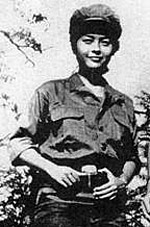




BANGKOK—A Burmese beauty queen-turned-activist has called for international intervention on behalf of thousands of ordinary Karen ethnic minority people forced into the jungle by a renewed government offensive in their homeland.
Louisa Benson, who now lives in the United States, called on the U.S. government, the United Nations, and the world to take action on behalf of the Karen refugees.
“Currently, the Karen people are suffering a lot. They are ordinary villagers who have nothing to do with the war,” Benson told RFA’s Burmese service.
“When I heard about the increased military offense by the Burmese government in [the area near the new capital, Pyinmana], it was extremely sad for me.”
“I’d like the U.S. government, or the U.N. or …[the Burmese opposition] National League for Democracy (NLD), or all of them to solve this problem,” she said. “As a Karen, I feel really sorry for them. They have to live in the jungle. It’s important to solve this problem.”
Currently, the Karen people are suffering a lot. They are ordinary villagers who have nothing to do with the war.
Benson was born in the Burmese capital, Rangoon, in 1941 to a Portuguese father and Karen mother. She became Miss Burma in both 1956 and 1958 and acted in several films.
She studied in Boston, returned to Burma, and married an ex-soldier and Karen insurgent, former 5th Brigade Commander Lin Tin, who later died. She subsequently married an American.
Overseas rights groups say Burmese army attacks on ethnic Karen civilians have displaced more than 10,000 villagers since November. Civilians seeking refuge in Thailand have also been placed at grave risk by landmines planted by the Burmese army along the border.
The New York-based Human Rights Watch urged the U.N. Security Council earlier this month to place Burma on its agenda in accordance with its April 28, 2006 resolution, “On Protection of Civilians in Armed Conflict.”
The resolution affirms a collective responsibility of all U.N. members to protect civilian populations from genocide, war crimes, ethnic cleansing, and crimes against humanity when their governments fail to provide that protection.
“The atrocious situation in Burma is exactly the kind of crisis the resolution was designed to address. Without swift and decisive Security Council action, the killings and abuses there will not stop,” Brad Adams, Asia director at Human Rights Watch, said in a statement.
Human Rights Watch has repeatedly urged the U.N. Security Council to put Burma on its formal agenda.
In November, the Burmese army, or Tatmadaw, began its largest offensive in the western and northern parts of Karen state since 1997.
Burmese troops have looted and burned homes and planted anti-personnel landmines in civilian areas to terrorize the local population, the group said.
“In some cases, villagers have reportedly been ordered by battalion commanders to leave their homes or face summary execution. Fleeing villagers have reported witnessing soldiers commit extrajudicial killings and torture. They have also reported that men, women and children have been forcibly conscripted to work either as army porters or as unpaid laborers,” Human Rights Watch said in a statement carried on its Web site.
Benson also called for an international campaign against the Burmese military junta’s plan to build a dam on the Salween River, which forms part of the border with Thailand.
“Previously, they were partners with UNOCAL and built the gas pipeline. And currently they have a project to build a dam on the Salween River. The government is getting a lot of revenue from these things,” she said.
“The problem is that these revenues are not benefiting the people. They are only increasing wars and helping the leaders become wealthy so that they can send their children to schools abroad. I think that if the projects are unsuccessful, they’d become a bit interested in peace,” she added.
U.S. President George Bush has signed a one-year extension of a declaration of national emergency, which underlies U.S. economic sanctions against Burma, according to a notice released by the White House May 18. The U.S. Congress first authorized sanctions against Burma in September 1996.
Original reporting in Burmese by San San Tin. Written and produced for the Web in English by Luisetta Mudie. Edited by Sarah Jackson-Han.